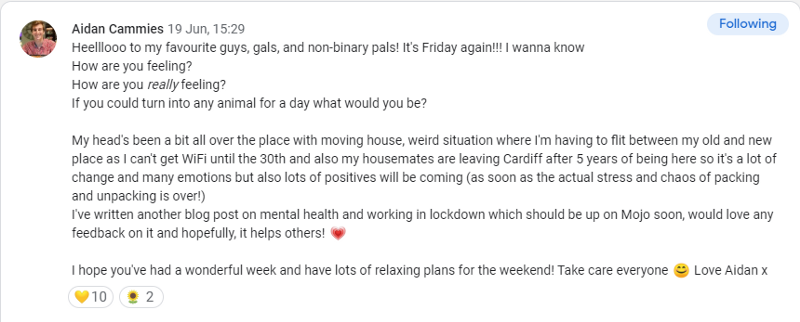Vulnerability in Lockdown. How to Bring Teams Closer Together when Far Apart
Vulnerability in Lockdown. How to Bring Teams Closer Together when Far Apart
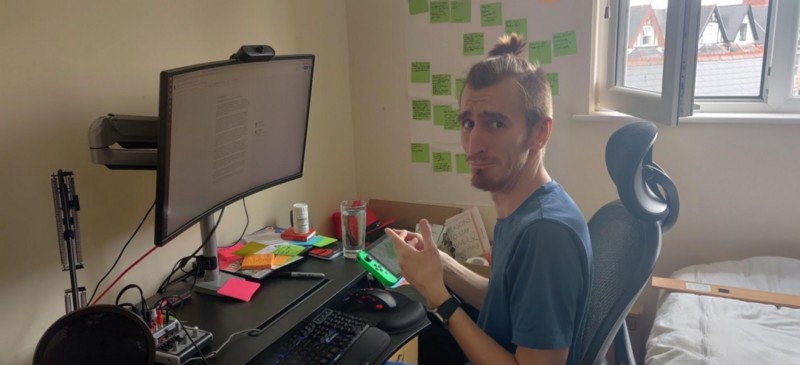
Repeat after me: remote working is not the same thing as working remotely during a quarantine. We’re currently all experiencing a global pandemic, it’s okay to not be doing your “best” work. It’s okay to feel anxious, it’s okay to feel afraid, it’s okay if you’re not using this time to become a Yoga master, it’s okay if you’re not having Zoom calls with friends & family every day. It’s okay to accidentally open up Animal Crossing in the middle of the workday. It’s okay to not be okay!
I’ve got ADHD, this is something that I’ve had my entire life but was only diagnosed with in the past two years. I wish I’d done this sooner. I used to think that ADHD meant you were fidgety and got distracted by squirrels (both of these are actually true for me). I didn’t know that ADHD also means intense Rejection Sensitive Dysphoria, an increased likelihood of suffering from anxiety and/or depression (been there, done that, got the t-shirt and wore it for two weeks straight). ADHD also means that I’m a master procrastinator (case in point: I started this blog post back at the beginning of May).
I work well by having external accountability and find it much easier to do stuff in a work environment. I’m writing this at my desk on a chair which is touching my bed. It ain’t exactly a work environment. I normally spend my time travelling to customer sites (the lack of 7 am trains was nice at first but the novelty wore off quickly) so when I’m at home it’s usually a “chill zone”. For me and so many others around the world the divide between work and home has blurred so much it’s difficult to tell where each starts and ends.
I’ve been (correctly) accused of caring for others’ mental health more than my own. So I’ve taken this time to finally reach out to a counsellor! It’s something that I’ve been putting off for ages due to stubbornness and choice paralysis. I rang up the Red Hat EAP (Employee assistance provider) and chatted to a few extremely helpful people who put me in touch with a local counsellor. They set up a time to have a call and then set up a video call. It was really scary to do but so worthwhile! I’m very fortunate to be in a position where I have incredible friends, family and colleagues who I can be fully open about my head with. These wonderful human beings have helped me so much and encouraged me to make myself a priority.
There’s a lot of stigma and perceived weakness attached to talking about your feelings but in my opinion, there’s nothing more badass than investing in yourself! You are the person that you’re going to spend the most time with in your life, take some time to get to know yourself and discover better ways to love yourself!
I’ve spent a lot of time thinking and talking about the effects of lockdown specifically with regards to mental health. One simple conclusion I’ve come to is, I don’t have all the answers. No one does. No article with a catchy headline like “7 simple tips to achieve ALL your goals in lockdown” is going to magically make everything bad in your life disappear. (Except this one of course.)
One thing I do know for sure is that talking about how you’re feeling helps. Sharing your stories and feelings with others is an incredibly tough thing to do, but one person doing so shows others that it’s safe to do so. We’re all human beings and it’s normal to experience a wide range of messy emotions and weird thoughts. Our brains haven’t really changed much in the past hundred thousand years. These prehistoric brains are optimised for gathering berries, hunting mammoths, and living together in tribes of ~150 other people. They weren’t designed to remember to pay taxes, live in an instantly interconnected society of billions of humans, or comprehend the enormity of our universe! So please try not to feel shame if you forgot to reply to an “important” email, your brain wasn’t designed for this!
A seemingly insignificant thing that’s missing from our work lives is the so-called “water-cooler chat”. A technique that I’ve used to combat this lack of social interaction is running daily check-ins with the team. Every morning we’d have a check-in with the team, during which we’d have a few questions like “How are you feeling today?” “How are you really feeling today?” “What did you have for dinner last night?” “What’s one thing that happened yesterday that made you smile?” “What are your intentions* for the day/meeting?” “What hobbies have you been trying?” “What’s good on TV right now?” “Any great books/articles you’ve read recently?”
*(Note, I love using the phrase intentions rather than plan/tasks as it recognises the fact that it’s okay to change what you’re doing over the day! You’re not tied to a list of things and it helps to reduce guilt if you didn’t “achieve” all of them!)
I’ll grab something near me, e.g. a rubber duck, and “throw” it to one of the team; if you have the duck then you can talk. We’ll chuck the duck around the entire team. This means that everyone has a chance to talk and crucially it gives people a chance to chat about their lives and find out more about one another! Jumping from conference call to conference call talking about work non-stop and not having a chance to stop and be human is exhausting; taking a few minutes to chat about anything else will help you to come together as a team.
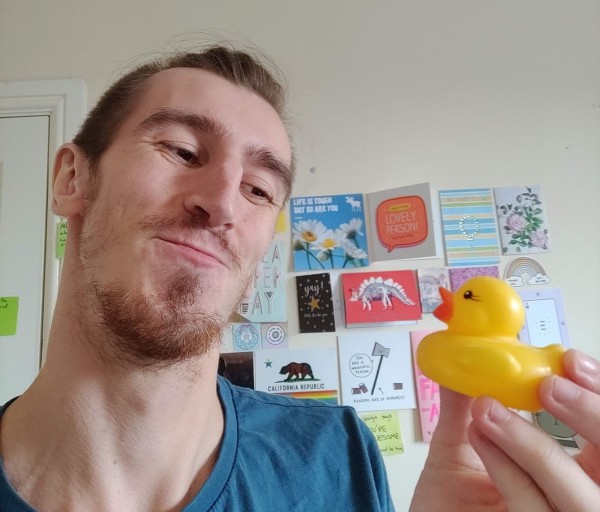
Side-note: If you’re scheduling meetings, try making them 45 or 50 minutes long. This gives people time to grab food, stretch, drink coffee, etc before attending another meeting. If everyone does this it reduces the chances of being late to meetings due to previous ones overrunning. Also, try adding a rough agenda and “expected outcomes” of a meeting. Don’t be afraid to decline meetings that you’re not sure about or ask “what input would you like from me in this meeting?”. If people can’t answer that, maybe it could be a nice brief email :)
With that in mind, I’ve been working behind the scenes to create a podcast series tentatively titled “Brainstorm”, which will cover a wide range of topics over the coming months but will open up by focusing on psychological safety. This will be internal to Red Hat at first but if there’s demand we’ll definitely make it available externally!
During UK Mental Health Awareness Week, we ran some simple but inspiring initiatives including the Random Act of Kindness Picker-Wheel; where associates were invited to spin a virtual wheel that would determine an act of kindness they should carry out that week — here’s a Jamboard (below) with stickies describing some of the acts of kindness carried out as a result of this simple initiative.
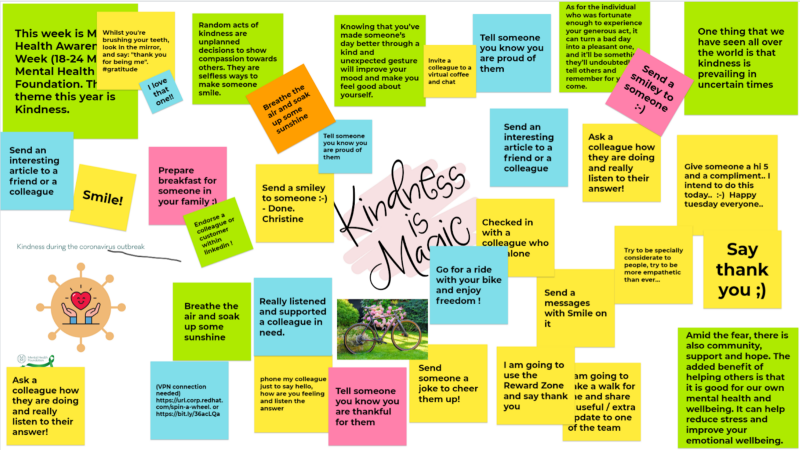
A Gratitude Wall was also created (below), providing associates with an opportunity to share the things they were grateful for. It sounds almost childlike in its simplicity, but a tonne of research has been done that backs up the power of gratitude. It’s easy to get caught up in the neverending cycle of always feeling like we need one more thing and then everything will be fine and perfect. Rather than focusing on what we don’t have, take a second to focus on the wonderful things that we already have! Let the people that we cherish and love know just how much we appreciate them! Taking a small amount of time to reflect and think about what we’re grateful for is an excellent antidote to dissatisfaction!
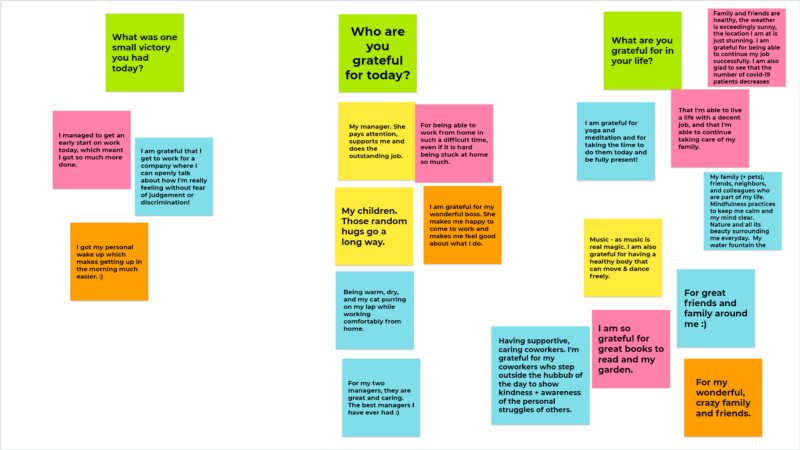
It’s tough to take time out to focus on your own mental well-being. Under lockdown conditions, it’s even harder. Try not to feel guilty if you’re not living up to an unrealistic expectation of what you feel like you “should” be doing. Try to replace should with could. It’s okay to talk openly about how you’re feeling, if others judge you for it then it’s more of a reflection on them than it is on you. It’s scary to talk about your mental health, but all it takes is one person to start a conversation and you’ll be positively surprised at how many other people respond with openness, kindness, and love!
We may not know how long it’ll take for things to return “to normal” or what will have changed. But at some point we will be able to go down to a beach and hold hands with the people that we cherish, we will be able to go to the movies and eat tasty snacks and laugh and enjoy the simple act of being surrounded by a bunch of unique, imperfect, wonderful human beings! In the tough times, I like to think of this wonderful excerpt from Matt Haig’s “Reasons to Stay Alive”
Stay safe and take care, everyone!
Aidan x
The super-long PS:
I originally wrote this internally at Red Hat and included the following :
“If you’d like an open space to talk about how you’re really feeling, join Neurodiversity/Mental Health Awareness google chat channel and find the Neurodiversity Community here.”
Rather than just deleting the parts that aren’t relevant externally I thought I’d give a bit of background to what they actually are. About a year ago I was travelling and for work and felt a bit alone and a bit bad in the brain department. I remember reading a post on Medium about someone who created a channel in their company-wide comms platform and called it “mental health”. This ended up being a wonderful space where people were openly discussing vulnerable topics and being greeted with kindness. (I’ve been trying to rediscover this article for ages, please drop a comment if you find it!)
I thought to myself “If I’m feeling a bit down I’m probably not the only one”, so I went ahead and created a channel that anyone could join and called it “Mental health chat”. I put a little blurb about who I was (pic below, it took A LOT of scrolling to find it)

I didn’t think much would come of it but thought it would be nice for people to have a space to talk about how they’re feeling. People responded with openness, support, kindness and love. Colleagues from all over the world are now openly sharing and supporting one another and it brings me so much joy every time I see a little bubble pop up on there. There are now over 400 people and it’s helped me so many times. Through this, I discovered the Neurodiversity D&I community, a community based on the philosophy that there’s no such thing as a “normal” or “average” brain. We all have unique neurodiverse brains and everyone has mental health regardless of if you’ve been diagnosed with a mental health problem or not!
It’s really scary to talk about how you’re feeling, especially to a group of strangers. But hopefully, this can show you that anyone can start a conversation about brains, and create a healthier, happier workplace!
